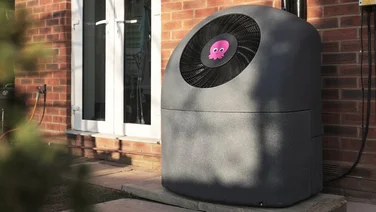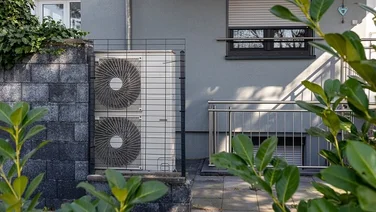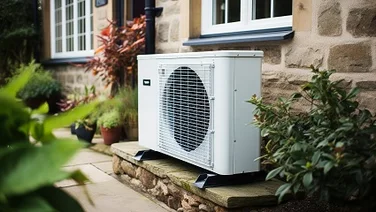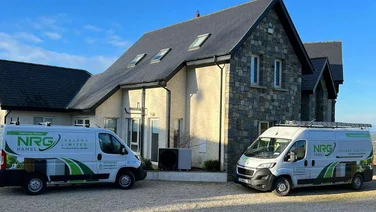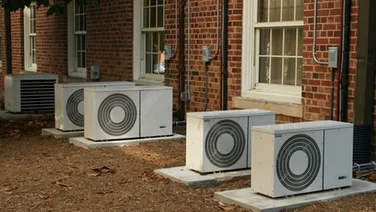Decided to bite the bullet and swap your old boiler for a new heat pump? Despite high heat pump costs, you have a lot to look forward to – a warm house, a smaller carbon footprint, and less maintenance to deal with.
Overall, air source heat pumps are pretty easy-going, but there are a few things you should do every now and then to keep them in good condition.
That’s why we’ve listed our top maintenance tips for air source heat pumps below – you’ll feel the benefits for years to come.
If you’re ready to feel these benefits, simply pop some details into our easy-to-use comparison tool, and our professional suppliers will be in touch with quotes for you to compare.

How much maintenance does a heat pump need?
Generally, air source heat pumps are a low-maintenance bit of kit. In fact, the most important part of looking after your heat pump is to keep it clean and make sure the airflow isn’t being obstructed.
Plus, if you look after your heat pump properly, it could last up to 20 years – compared to the average boiler’s lifetime of 15 years. A little TLC goes a long way.
Air source heat pump maintenance checklist
If you really want to get the most bang for your buck, make sure to carry out the following checks every year – after all, you’ll reap the rewards for roughly two decades.
Although air source heat pumps vary in some ways – they come in all shapes and sizes, with some mounted on the floor and others mounted to the building they serve – there aren’t very many differences when it comes to maintenance.
We’ve listed a few simple techniques below to help you look after your precious pump. But remember, before you do anything, make sure to turn off the heat pump – this way you can avoid any nasty electrical faults or safety issues.
1. Keep it clean
Keeping your air source heat pump spick and span will help it last longer and keep it working efficiently. Some key cleaning techniques include:
- Wiping down the coils – Use a soft brush to remove dust and debris from the coils, and then give them a wipe with a damp cloth
- Replacing filters every 30-60 days – By doing this, you can prevent any blockages to the airflow. You can also clean the filters by removing them from the heat pump, vacuuming the dust off, and soaking them in some mild detergent
- Removing the fan blades and wiping away dirt – Similar to the coils, use a soft brush to get rid of dust and debris, and then give the blades a wipe with a damp cloth. If the fan belt looks a little loose, you can always adjust or tighten it
- Cleaning the registers – These are just grilles with moving parts, which allow them to be opened and closed depending on the airflow. To clean them, all you have to do is use a soft-bristled brush to clear dust, pet hair, and other light debris
2. Remove any obstructions
Airflow is key when it comes to air source heat pumps. Even a little bit of overgrown grass starting to encroach the unit could be the difference between a warm or chilly winter in your household.
Two key ways to avoid obstructions getting in the way of your heat pump include:
- Removing encroaching grass, stray leaves, dirt, and other debris – It’s a good idea to keep the area around your heat pumps cut back and as clean as possible
- De-icing your unit – During winter months, the outdoor unit can get iced over, which can prevent the transfer of heat between the refrigerant (a substance that absorbs and rejects heat as it circulates in the heat pump system) and the air. Some models even have a defrost setting that gradually melts the ice to help with this issue
3. Inspect the unit every now and then
- Check the outdoor unit for visible leaks – Most heat pumps have a drain pan that is used to collect condensation from the unit. If this pan becomes clogged with debris, mould, or even algae, it could overflow and create a puddle around your heat pump. So don’t panic if you see a leak – a simple cleaning job could fix it in a matter of minutes
- Refill glycol (antifreeze) – This prevents the unit from freezing up and breaking during the winter. In most cases, you’ll need to refill the antifreeze annually to cover the warranty from the manufacturer
- Monitor the system’s water pressure – You should check the pressure when the system is cold, and aim to have the gauge around the 0.7 bar for a bungalow, and around the 1.2 bar for a two-storey house
4. Test the controls
It’s a good idea to check whether all the electricals are working in your heat pump system every now and then.
This can be as easy as taking note of how your thermostat and TRVs (thermostatic radiator valves) are responding. It’s also key to check whether the pressure valves are working when you crank up the heat. If you notice a fault, it’s worth calling someone out to determine whether something has gone wrong in the internal system.
If your heat pump provides hot water as well as space heating, it’ll probably have a two-channel controller, which programmes different temperatures and times for each setting. Every few months, you’ll want to monitor how the controls are working, checking that the temperature is correct.
5. Get it serviced
You should get your system serviced by an air source heat pump engineer every 2-3 years – although, some warranties will require this to be done annually.
We also recommend getting your heat pumps serviced before winter. This way, if there are any nasty surprises, you won’t be left without an efficient heating supply during the cold months.
During an inspection, the engineer will conduct a comprehensive audit of the system, including:
- Refilling the amount of refrigerant if it’s running low
- Assessing water pressure levels
- Checking ducts for leakage, and repairing them if need be
- Measuring the airflow to see if it is at a sufficient level
- Inspecting indoor coils, filters, and blowers for dirt and other debris
- Lubricating motors and moving belts
- Looking out for any wear and tear
- Making sure the heating controls are operating properly
- Testing the thermostat is responding properly
Want to get a better idea of what it’s like to own an air source heat pump? Check out our case study with Louise, from South London.
Louise had a 12-kilowatt air source heat pump installed to reduce her reliance on fossil fuels, and received £5,000 off the upfront cost through the Boiler Upgrade Scheme. Now, Louise can enjoy a warm, even temperature throughout the house, without fluctuations.
Take a look at the full interview with Louise to learn more.

Air source vs ground source heat pumps
Both air source and ground source heat pumps are relatively low maintenance.
It’s recommended to get a ground source heat pump serviced at least once a year, to make sure everything’s ticking along nicely.
If you own or plan to get a ground source heat pump, each year you’ll need to:
- Check if the compressor is sealed – if not, it will have to be replaced
- Make sure the electronics and controls are all working properly
- Inspect above-ground pipes and connectors for leaks
- Monitor the water pump – this is the only moving part, so make sure there’s no wear and tear before winter
- Refill the antifreeze – this will make sure the system fluid doesn’t freeze underground
How much does air source heat pump maintenance cost?
Generally, getting your air source heat pump serviced will cost you between £150-200. However, this price can fluctuate, depending on the company you go with and the size of your heat pump.
Heat pump maintenance actually costs considerably less compared to traditional gas- or oil-fuelled boilers. Other than the annual service cost, as well as buying antifreeze and filters, there’s very little that you’ll have to pay for.
Like most mechanical systems, you might need to get a few parts replaced over the years to keep the unit working efficiently.
These costs will range, depending on what parts you need. If you need to get a water pressure valve, for example, you’ll only be set back £20-£40 (plus labour costs), whereas a replacement condenser will potentially mean forking out thousands of pounds.
How to stop a heat pump from losing pressure
Just like a conventional boiler, your air source heat pump might get low pressure from time to time. This can be caused by either low refrigerant levels or a dirty air duct – two very easy issues to fix.
To increase the pressure, all you have to do is either top up the refrigerant or remove the air duct parts and give them a good clean.
If you find these simple fixes don’t work, there might be something else wrong in the internal unit, which means you’re best off calling out an engineer to figure it out.

Benefits of maintaining an air source heat pump
- Extends the life of your air source heat pump up to 20 years
- Gets rid of bacteria and odours by unclogging filters, fan blades, and coils
- Enhances heat pump efficiency
- Reduces domestic energy consumption and the homeowner’s carbon footprint
- Minimises the chance of the system breaking down
- Keeps your unit compliant with Renewable Heat Incentive (RHI) requirements, as well as the manufacturer’s warranty
Next steps
There you have it – all the different ways you can look after your air source heat pump.
Although it might not seem like much – brushing a bit of dirt off here, cutting some grass back there – it’ll make a world of difference.
If you feel ready to buy a heat pump for your home, just pop your details into our free quote tool, and our wonderful suppliers will be in touch with their best prices.
You can also read about what the UK thinks about heat pumps in our 2023 National Home Energy Survey, which revealed that just 25% of Brits would accept a free heat pump.

